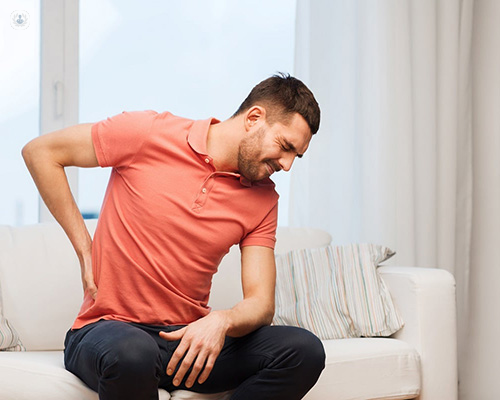Are kidney stones preventable?
Escrito por:Kidney stones are a common cause of sudden, excruciating pain that requires medical attention. Often they appear with no warning, so is there a way to prevent them forming in the first instance? In our latest article, Dr David Game, esteemed London nephrologist, explains how kidney stones form, their associated symptoms, and whether they can be prevented.

What is the main cause of kidney stones?
Kidney stones are formed when chemicals that are present in the urine precipitate at a certain concentration, meaning they form a solid compound, which is known as a stone. The substances that combine to form a kidney stone are usually present in the urine, however, they are just at a higher concentration than normal, and therefore they precipitate. The commonest compounds involved in kidney stone formation are calcium, oxalate, occasionally urate, and something called cysteine. The increased levels of these compounds in the urine may be due to a genetic abnormality, diet, or another factor that can be diagnosed in a clinic.
What symptoms do patients normally experience?
If a kidney stone is located in the kidney and not in the ureter, the tube that connects the kidney to the bladder, the stones usually present no symptoms at all. Stones that drop out of the kidney and lodge in the ureter can result in severe pain in the groin or back, which radiates into the groin and into the testicles or penis in men. This pain can barely be tolerable until the stone is passed. Anyone experiencing this pain usually is brought to a hospital where a diagnosis is made shortly after.
What advice would you give to help prevent kidney stones?
Kidney stone prevention is quite complicated, this is why it is important to see a specialist who has some knowledge of this. The main preventative method is to increase fluid intake so you’re passing at least 2 liters of urine a day. In some people, it may even need to be more. Depending on the stone and the biochemical abnormalities, other things can be done additionally to prevent kidney stones. If one has a hormonal abnormality that is causing a high calcium level, this can be treated with medicine, or in some cases surgery. Interestingly, lowering calcium intake in most cases won’t make any difference, resulting rather in an increased concentration of something called oxalate.
If there are deficiencies in the constituents of the urine, for example, citrate, this can be improved by the diet and also in some cases by citrate supplements. Some rare genetic conditions that cause kidney stones need specific treatment and for this, you would need to see a specialist. Other general things that can be done to reduce the risk are improving general lifestyle measures, like losing weight and reducing salt intake, for example. Due to the complexity of kidney stone prevention, the advisable thing to do is to speak to a specialist.
Are there any food or drinks which you would particularly advise avoiding?
While increasing your fluid intake, and in turn, your urine flow is vital in preventing kidney stone formation, it is essential to consider what you’re drinking. What you drink mightn’t affect urine flow, but if someone is consuming a sugary, fizzy drink then there is a calorie component that might impact weight gain, which results in all sorts of health problems. For that reason, water, perhaps with some fresh fruit juice squeezed, is suggested. Coffee is probably neutral, but it can cause bladder irritation in some people. Particularly acidic drinks should also be avoided. On the whole water, fizzy water, and water with fruit juice are the optimal choices.
Are some people more susceptible to developing kidney stones than others? Why?
Some people seem to be predisposed to kidney stones, and in some cases, the reason may be clear. They may have a genetic condition or a particular predisposition to a high level of one of the previously mentioned compounds that cause kidney stones. Mostly, however, the reason is undeterminable. Although we can give advice about biochemical and dietary changes that will reduce the chances of having future kidney stones, the reason why any particular person has, for example, a higher level of calcium in the urine or a particular acidification problem, may never be found. One has to conclude, like many medical conditions in modern life, that there are multiple genetic and environmental factors that are contributing. The important thing is that with the correct assessment, we can give good advice around what to eat, drink, and any supplements or medication that can reduce the chance of further kidney stones.
If you would like too book a consultation with Dr David Game you can do so by visiting his Top Doctors profile.


